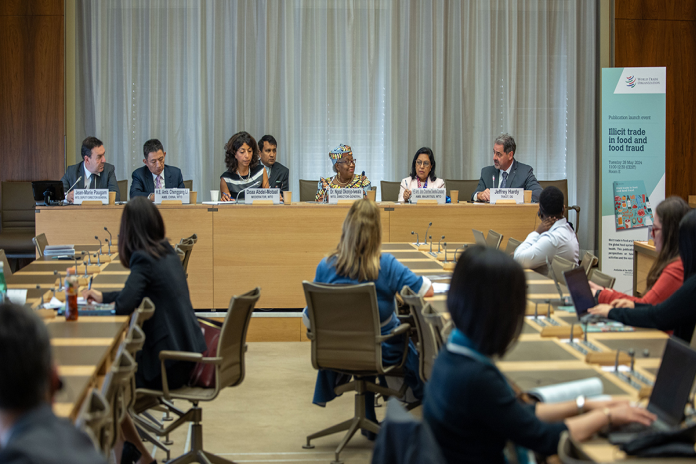New WTO publication highlights strategies to tackle illicit trade in food and food fraud

GENEVA, Switzerland – A new World Trade Organization, (WTO) publication launched on 28 May looks into the challenges of combating illicit trade in food and food fraud and discusses the role the WTO could play in helping to address this issue. At the launch event, leaders from business and international organizations and other trade experts discussed the urgent need for the international community to act collectively and explored strategies for overcoming current challenges.
“Illicit Trade in Food and Food Fraud” brings together contributions from experts in international organizations, non-governmental organizations, the private sector and the WTO Secretariat, who underline the detrimental impact of illicit food trade on food security and public health. The contributors outline various strategies to counter illicit food trade and food fraud, recognizing that a comprehensive response requires a blend of regulatory measures, enforcement, industry cooperation and consumer education. The publication also outlines action taken by various agencies in these areas and highlights that a range of WTO agreements provide an effective toolkit that can contribute to combating illicit trade.
In her opening remarks, director-general Ngozi Okonjo-Iweala explained the importance of the WTO’s engagement in this conversation, emphasizing its role in disciplining international trade and preventing the “law of the jungle,” adding: “The levelling of the playing field must extend to weeding out all forms of illegal trade and fraudulent activities,” including sub-standard food, falsely labelled food, counterfeit goods and smuggled products.
The director-general highlighted the substantial economic impact of these issues, with estimated annual economic losses for global traders ranging between US$ 30 billion and 50 billion. This excludes losses associated with illicit trade in alcoholic beverages. Director-General Okonjo-Iweala noted that illicit activities are pervasive across all continents, penetrating most agri-food sectors, such as olive oil, honey, essential oils, wines and spirits.
Discussing the role of the WTO rulebook in supporting governments’ efforts to address these challenges, she emphasized the importance of the WTO Agreement on Sanitary and Phytosanitary Measures (SPS) and the Agreement on Technical Barriers to Trade (TBT) in regulating food imports based on scientific and risk assessment techniques and addressing deceptive practices. She also underlined that the WTO’s Trade Facilitation Agreement (TFA) can facilitate legal trade flows and serve as a vital tool to curb counterfeit food and beverages.
“We need to leverage these agreements, and indeed the whole WTO toolbox, to fight illicit trade and food fraud,” the DG said. She expressed the hope that the publication would spur discussions and action on the subject and underlined the importance of focusing efforts on prevention, a key message highlighted by the publication.
The director-general of the Transnational Alliance, Jeffrey Hardy, stressed the “wide range of negative impacts” that illicit trade in food has on businesses, resulting in economic losses of up to half a trillion dollars when including the fish and spirits sectors. He warned that driven by high demand for food and the growing world population, the illicit food trade will only become more rampant in the near future. “You’re not going to be able to achieve the UN Sustainable Development Goals unless real efforts are taken to mitigate illicit trade,” Hardy added.
The CEO of the World Spirits Alliance (WSA), Helen Medina, highlighted the serious threat the spirits sector is facing, with one out of four bottles of spirits being illicitly traded, primarily through smuggling, fraudulent activities and tax evasion.
Medina commended WTO rules that help fight against the problem and also underlined the WSA’s readiness to engage in conversations with the WTO and other organizations on this topic as well as to contribute to consumer education. “It’s important for consumers to understand that it’s crucial to punish and prevent illicit trade through robust controls and enforcement,” Medina said.
Ambassador Usha Chandnee Dwarka-Canabady of Mauritius welcomed the timely discussion of the topic at the WTO. She underlined the importance of food safety for a net food-importing country like Mauritius: “When you import food for your own consumption and almost 70 percent of it is imported, you have a duty to make sure that your system in place is foolproof.” She outlined major challenges in achieving this goal despite diligent border control and other food safety measures. She highlighted the need for support in capacity building, better engagement in global standard-setting, and improving accessibility to new technologies in customs management.
Ambassador Chenggang Li of China introduced the country’s “targeted efforts” at the borders to combat illicit trade, including fighting trademark infringement, implementing a modernized government system for monitoring the safety of imported food, and leveraging social media to improve transparency and public awareness. He believed that the WTO has and will continue to play a significant role in supporting member governments’ efforts. “The WTO is well-placed for members to share their own practices, including laws and regulations, and explore possible ways to enhance cooperation. More could be done in this area,” he said.
Deputy director-general Jean-Marie Paugam indicated that many lesser-known WTO Agreements have a critical role to play in combatting fraud, such as the Customs Valuation Agreement and the Agreement on Pre-Shipment Inspection. Director-General Paugam also indicated that trade opening could reduce the incentives for smuggling and fraud. “The WTO never prevents any country from regulating trade,” but added that “to promote trade liberalization is also a disincentive for criminal activities.”
DDG Paugam reaffirmed the WTO’s commitment to providing members with technical assistance and capacity-building strategies to help them implement relevant WTO trade rules to combat illicit trade.
The launch event is available on the WTO’s YouTube channel at:
https://www.youtube.com/watch?v=s2CrfvI4WIs The publication is available here.
Source: caribbeannewsglobal.com

